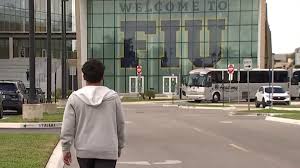‘We’re All Scared’: Florida ‘Dreamers’ Brace for College Tuition Increase
In the past, both political parties supported offering in-state tuition to undocumented students who arrived in the U.S. as children. However, lawmakers are now pushing for ‘Dreamers’ to pay higher, out-of-state tuition rates.
For the past decade, undocumented students who were brought to the U.S. as children—commonly known as “Dreamers”—have been eligible to pay in-state tuition rates at Florida’s public colleges and universities. This policy, which was originally backed by both Republicans and Democrats, aimed to make higher education more accessible for these students.
In 2014, former Governor Rick Scott signed the measure into law with bipartisan support. However, political attitudes have since shifted, and now, the Florida state legislature is expected to pass a bill that would eliminate this benefit. The proposal is being discussed during the special legislative session currently underway in Tallahassee.
Even some Republicans who previously supported in-state tuition for Dreamers, such as Jeanette Nuñez—who is set to become the next president of Florida International University—are now advocating for these students to pay out-of-state tuition rates instead. If passed, the new law could significantly increase the financial burden on Dreamers seeking higher education in Florida.

Jose’s story is a prime example of how this policy change could impact undocumented students. He came to the United States at just five years old and has spent nearly his entire life in Florida. Having attended public schools and grown up in the state, he strongly identifies as a Floridian.
Reflecting on his experience, Jose emphasizes that he has followed the same path as many of his peers. “Like everyone else, I’ve studied here since I was young. I’ve worked here, I’ve paid taxes here—I’ve done basically what most Americans do,” he explained. Despite his deep roots in the community and contributions to society, he now faces the possibility of losing access to affordable higher education due to the proposed tuition policy change.
To protect his privacy, we are not disclosing Jose’s last name. When asked about his thoughts on the potential repeal of the in-state tuition waiver, he expressed a deep sense of disbelief and frustration.
“It’s mind-blowing because I think it’s unfair,” said Jose, a sophomore majoring in computer science. For him, the proposed change feels like an unjust reversal of an opportunity that has allowed him to pursue higher education. Like many other undocumented students who grew up in Florida, he now faces the uncertainty of significantly higher tuition costs, which could jeopardize his ability to continue his studies.
At Florida International University (FIU), the cost of in-state tuition is approximately $6,000 per year, while out-of-state students are required to pay nearly three times that amount. For undocumented students like Jose, who have relied on the in-state tuition waiver, the prospect of suddenly facing such a dramatic tuition hike is overwhelming.
“To suddenly go from paying a certain amount to this boatload amount, it’s just insane to me,” Jose said, expressing his disbelief at the proposed change.
When I pointed out that some critics argue undocumented students should never have been granted in-state tuition in the first place, he was quick to respond. “It is fair. Just like every other student, we worked hard to get where we are,” he said, emphasizing that Dreamers have earned their place in the education system through years of dedication and effort.
However, Republican State Senator Randy Fine has been leading the charge against the tuition waiver, arguing that it provides an incentive for undocumented immigration. “We don’t believe that illegal immigrants should pay less to go to college than Americans, and that’s the case,” he stated on the Senate floor Wednesday. According to Fine, approximately 6,000 Dreamers are currently enrolled in Florida’s public colleges, including more than 500 at FIU and around 800 at Miami Dade College.
For Jose and many others like him, the uncertainty surrounding their future is deeply unsettling. “We’re all scared,” he admitted. “We’re all trying to fight to at least keep the in-state tuition for us because we find it really unfair that after all these years of working hard toward achieving this goal of going to college, all of a sudden it’s going to crumble for us. There’s honestly little we can do.”
Unfortunately, Jose’s fears are not unfounded. It is all but certain that the Florida legislature will vote to revoke in-state tuition for Dreamers, leaving students like him scrambling to figure out how to afford their education. But for Jose, the fear goes beyond tuition costs. Every day, he worries about the possibility of being deported to a country he barely remembers—one that feels foreign to him after spending nearly his entire life in Florida.


Comments are closed, but trackbacks and pingbacks are open.